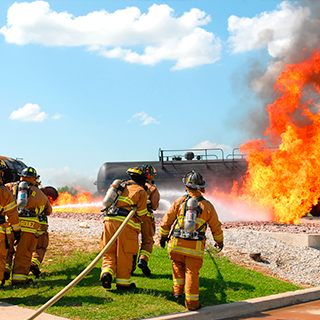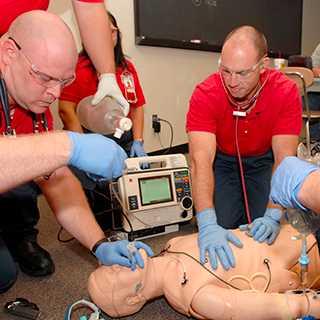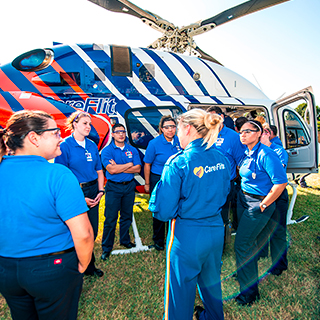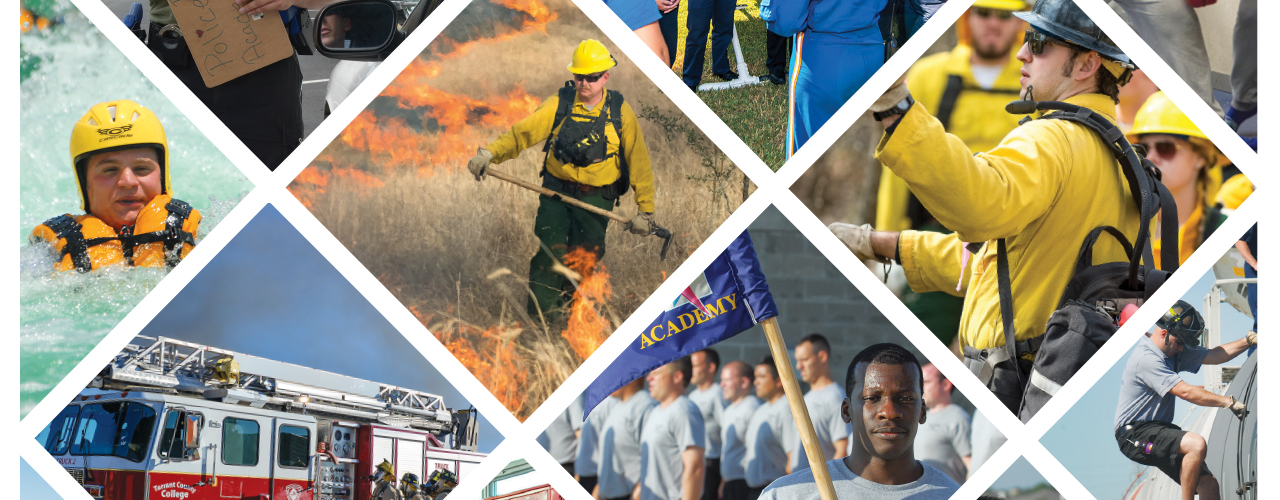Compassion in Action
Public Safety Programs Prepare Students for Life-and-Death Situations
The cyclist was in critical condition. The driver who hit him stood by, distraught. Firefighter Janet Onim remained cool and collected, even as she felt deep sympathy for the injured man and his loved ones.
“I wondered where he’d been headed on that bike ride and whether someone was waiting for him at a destination he never reached,” recalled Onim, a firefighter with Dallas/Fort Worth International Airport. “One part of me was taking in the scene, watching, sensing and feeling as an observer. The other part of me, adrenaline-surged and urgency-driven, worked quickly and efficiently to save a life.”
That joint sense of compassion and action is all in a day’s work for Onim, who is among thousands of North Texas public safety professionals who prepared for their careers at Tarrant County College. The College is one of the primary educators for first responders in the region, offering fire protection, law enforcement and emergency medical services training. Public safety programs reflect one of TCC’s core goals – to serve the community – and be its first choice for partnership.
Fire Protection
TCC’s Fire Academy is considered by area departments the program of choice for aspiring firefighters. Covering basic fire curriculum set by the Texas Commission on Fire Protection, the Academy offers students 14 weeks of lecture and hands-on experience at the College’s Fire Service Training Center (FSTC)—a modern, high-tech facility spread throughout 22 acres at TCC Northwest.
“The concept for the design was ‘How do we get this facility to be as close as possible to what they will encounter in the real world,’” explained Tommy Abercrombie, an alumnus of the TCC Fire Academy, lieutenant with Fort Worth Fire Department and a former part-time coordinator for TCC’s program. “Realism drove everything we did.”
 One key to that realism is the simulated city located on FSTC grounds. The site includes
mock streets, residences, an apartment-hotel complex, a café, a store, a high-rise
building and more. The buildings are outfitted with propane and liquid petroleum gas
props for live firefighting experience.
One key to that realism is the simulated city located on FSTC grounds. The site includes
mock streets, residences, an apartment-hotel complex, a café, a store, a high-rise
building and more. The buildings are outfitted with propane and liquid petroleum gas
props for live firefighting experience.
“An instructor can immediately shut the fire down, which makes our training relatively safe,” said Bill Pearson, Fire Academy coordinator.
The simulated city includes a train derailment with a hazardous materials scenario, and a wrecked plane allows students to practice pulling victims to safety. A field of rubble is used to teach urban search and rescue, and a swift-water rescue prop teaches emergency responders to navigate floodwaters. The hands-on skills building is key to the value of TCC’s program.
“TCC graduates are extremely well trained and are ready to be integral members of our team from the beginning,” said Euless Fire Department Chief Wes Rhodes—one of several Tarrant County fire chiefs to serve on the TCC program’s advisory board.
While some students go through training in preparation to apply to various agencies, most cadets – like Onim – are hired by an area department before they begin the Fire Academy. They learn from 10 full-time faculty and staff; the program also employs more than 130 professional firefighters as adjunct instructors.
“This is invaluable, ensuring that students get the most up-to-date teachings, which is very important given the changing science and technology of fire service,” said Onim, who was the first woman to serve as a TCC class captain. “The instructors bring their expertise to the classroom, but they also make it possible for students to tour their facilities and jurisdictions to see and experience, firsthand, real-world firefighting.”
At the Fire Academy’s conclusion, students are well prepared to take the Texas Commission on Fire Protection Basic Fire Suppression certification exam.
“I believe the lessons I learned could make the difference one day as to whether I make it home to my family,” said Onim.
In addition to the Fire Academy, TCC offers professional development opportunities for area fire departments and an Associate of Applied Science in Fire Protection Technology. The degree is typically achieved by firefighters moving up their departments’ ranks. Fire Academy participants can earn 18 hours of credit toward the associate degree.
Law Enforcement
TCC’s Police Academy prepares students for a career in law enforcement. Over a 19-week period, cadets experience classroom training and real-world scenarios, culminating in the Texas Commission on Law Enforcement Basic Peace Officer licensing exam. Most cadets are sponsored by an area police department.
“The few independent cadets we have are typically recruited early within the academy,” said William Griffith, Police Academy director.
Cadets complete their training at state-of-the-art facilities at TCC Northwest—including a 36,000-square-foot indoor firing range and a National Academy of Professional Driving-approved driving training course. They also go through specialized programs including active shooter, advanced defensive tactics, K-9 and drug interdiction. TCC’s Police Academy exceeds the minimum state requirements for basic peace officer training, offering additional training hours.
“Within the Academy, skills-based training using scenarios has expanded greatly,” said Griffith. “Now, all areas are practiced many times by the cadets before graduation.”
That scenario-based training makes Academy graduates highly valued by police departments.
“As a graduate of TCC’s Police Academy, I know the high standards they demand from the recruit officers,” said Chief Cody Phillips of the Haltom City Police Department.
The officers graduating from Tarrant County College are better prepared and become an extremely valuable asset to any department because of the high standards they are held to throughout the Academy. I have no reservations about Tarrant County College as our primary choice for recruits.
Chief Cody Phillips,
Haltom City Police Department
Academy resources are so advanced that federal agencies have partnered with the College for training. Personnel from the FBI, U.S. Department of Justice, U.S. Department of Defense, U.S. Department of the Treasury and the U.S. Postal Service all have trained on campus at TCC Northwest.
The Police Academy is just one component of TCC’s law enforcement programs. The College also offers an Associate of Applied Science in Criminal Justice; Police Academy cadets can earn up to 18 hours toward the associate degree. In addition, the Criminal Justice program awards crime analyst certificates and occupational skills awards in security management.
“Public safety and law enforcement opportunities expand rapidly as Tarrant County grows,” said Tracy Hearn, associate professor of Criminal Justice. “Earning a certificate or a degree is a great way to open up higher earning potential and command-level jobs.”
The program includes courses that cover fingerprinting and other forms of hands-on crime scene processing. Criminal Justice also offers internship opportunities and hosts industry professionals as visiting lecturers on topics such as crime scene investigation, the judicial system, juvenile justice, the Drug Enforcement Agency and more. A variety of professionals from law enforcement, the probation system and federal agencies serve on the program’s advisory committee. Students also take part in field trips to locations such as police departments and incarceration facilities.
“There’s no substitute for real-world experience,” said Hearn.
Criminal Justice graduates go on to work as police officers, dispatchers, private security officers and juvenile justice professionals. Many other students continue their education in four-year university programs as well as law school.
Emergency Medical Services
Based at TCC Northeast, the Emergency Medical Services Program trains students as paramedics and emergency medical technicians (EMTs). The EMT Program, the first level of certification, covers basic life support procedures. EMTs work alongside paramedics to deliver care before a patient reaches the hospital. Paramedic students learn basic and advanced life support procedures, in preparation to be primary care providers in a fire department or advanced-level ambulance.
“EMTs and paramedics never know what the next call will be and have to be ready and prepared for anything, with very little warning,” said Jeff McDonald, EMS Program coordinator.
Hands-on experience in the classroom and in clinical settings provides the students with the cognitive tools to make life-and-death decisions at a moment’s notice.
Jeff McDonald,
EMS Program Coordinator
 TCC’s paramedic students complete 256 hours of hospital clinical experiences in emergency
departments, intensive care units, labor and delivery wards, surgery/anesthesia and
other areas. They also undergo 240 hours of field practicum in ambulances. EMT students
complete 80 hours of clinical experiences, split between ambulances and emergency
departments. TCC students also have access to portable simulation manikins.
TCC’s paramedic students complete 256 hours of hospital clinical experiences in emergency
departments, intensive care units, labor and delivery wards, surgery/anesthesia and
other areas. They also undergo 240 hours of field practicum in ambulances. EMT students
complete 80 hours of clinical experiences, split between ambulances and emergency
departments. TCC students also have access to portable simulation manikins.
“We do considerable training using scenarios that simulate the real-world experiences they can expect to encounter,” said McDonald.
In addition to partnering with many Tarrant County emergency medical providers and hospitals for clinical experiences, TCC’s program advisory committee is made up of representatives from the Tarrant County medical community.
“As one of the largest EMS and mobile healthcare systems in the United States, MedStar Mobile Healthcare feels that the partnership with Tarrant County College's EMS Program is invaluable,” said Macara Trusty, education director for MedStar and a member of the advisory committee. “We know that graduates of TCC’s EMS program are well-prepared to provide the best possible patient care from day one on the job.”
Students who complete the paramedic program and additional general education courses graduate with an Associate of Applied Science in Emergency Medical Services. With this degree, graduates can become paramedics licensed by the Texas Department of State Health Services—the highest level of paramedic training. Students who complete the paramedic program without additional coursework earn a certificate and are eligible to become certified paramedics. Those who complete six hours of the EMT program and additional general education courses can become certified as EMTs.
Graduates go on to careers with ambulance providers, fire departments, emergency departments, air ambulances, helicopter rescue services, industrial safety programs and other emergency medical providers. Employment of EMTs and paramedics is expected to increase 15 percent, much faster than average, between 2016 and 2026, according to the Bureau of Labor Statistics.
“Our graduates are easily employed in the Tarrant County community and highly desired by employers,” said McDonald.
Program Successes
 TCC’s public safety programs produce graduates ready to take on perilous challenges
in the community, and certification exam pass rates reflect that readiness.
TCC’s public safety programs produce graduates ready to take on perilous challenges
in the community, and certification exam pass rates reflect that readiness.
The Texas Commission on Law Enforcement reports that between 2008 and 2017, TCC’s 959 graduating Police Academy cadets achieved a 100 percent pass rate on the peace officer licensing exam. Police Academy leaders say the quality of graduates is even more important than the stellar pass rate.
“The TCC program is currently rated as one of the very best in Texas and is frequently used as an example of what a police training program should be,” said Griffith. “The Texas Commission on Law Enforcement has suggested to several agencies that they contact us and tour our facilities to get ideas for improvement.”
First-time pass rates for both EMT and paramedic certification exams typically exceed 96 percent. That is significantly above state and national averages.
The Fire Academy, which has graduated more than 2,000 students since it began in 1989, has a 90 percent certification exam pass rate for first-time testers. With second-time testers, the pass rate rises to 98 percent.
Those strong outcomes reflect first responders’ dedication to their profession.
“Firefighting is a calling. When I started this job, my mentor advised me firefighting would not make me rich—but if my desire was to go home every day feeling like I changed someone’s life for the better, or that I was present and effective in mitigating the worst day of someone’s life, then I was in the right place.”
Janet Onim,
DFW Airport Firefighter and TCC Graduate


![//parameter[@name='author']](/magazine/assets/images/authors/alexis-patterson.jpg)